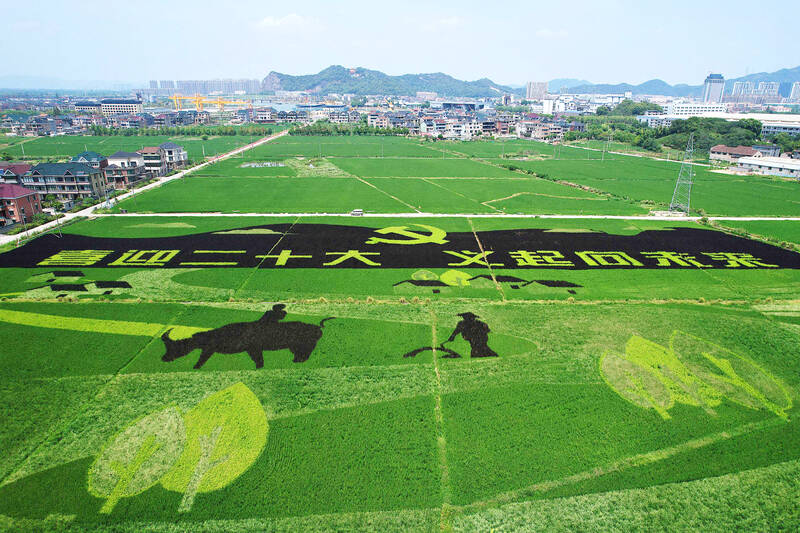The spotlight at China’s leadership congress next month will fall on the elite line-up installed to steer the world’s No 2 economy. But another lesser-watched group will also advance, and an eventual successor to President Xi Jinping (習近平) is likely among them.
They’ve been called the Luckiest Generation: Communist Party cadres born in the 1970s. They missed both the Mao Zedong (毛澤東) era, which unleashed havoc on education and the economy, and the high unemployment levels and housing crises facing today’s graduates.
Instead, China’s startling economic rise carried them into university and to the top of industries from finance to commodities. They built careers during a brief window of Internet freedom, economic integration through the WTO and global mobility — freedoms Xi has constricted with censorship, trade actions and COVID border closures.

Photo: AFP
More than 100 of the 70s generation already occupy senior positions across provinces and ministries. As Xi moves toward a landmark third term at the party’s twice-a-decade congress, they’ll march closer to power. They’ll comprise some 10 percent of the 370-odd members on the next Central Committee, mostly as alternates, according to Cheng Li, a scholar at the John L Thornton China Center at The Brookings Institution.
If Xi keeps age caps for everyone but himself as widely expected, leaders born in the ’60s will retire over the next decade. That would clear a path for the 70s cohort to join the powerful Politburo. Xi himself will be 79 if he reaches the 2032 congress as party leader, older than any previous general secretary.
“This is a very important generation. They’ll be the ones who run up against a potential power transition,” said Victor Shih, an associate professor at the University of California San Diego who researches elite Chinese politics. “Their mentality could be a bit more open to the world at just the right time.”
The 70s generation will ascend to China’s leadership ranks during a period in which the country could finally overtake the US as the world’s largest economy, even as growth slows and population decline takes hold. They’ll likely be in charge of key regions and agencies in the latter part of this decade, when American military commanders estimate Xi will achieve the capability to take action across the Taiwan Strait.
Still, their relatively easy success could have given them “above average” expectations about the party’s ability to enrich society, leading them to endorse more state control and opposition to Western values, said Fei-Ling Wang, professor at Sam Nunn School of International Affairs at the Georgia Institute of Technology. “They only have memory of the good years,” he said. “Until, of course, very recently.”
Here are five officials to watch:
ZHUGE YUJIE, 51
In March, Zhuge became the youngest deputy party secretary in the country, as right-hand man to Shanghai party chief Li Qiang (李強) — a long-time Xi associate. The financial hub where Zhuge was born and raised has traditionally been a springboard to high office. Xi is a former Shanghai party secretary. Zhuge worked in state-owned enterprises before entering politics, a career path common among the 1970s cohort, many of whom have led flagship enterprises or major financial institutions.?
LIU HONGJIAN, 49
Liu became the youngest member of a provincial party standing committee when promoted to lead a government legal affairs unit last year. Previously, he worked in Fujian for almost two decades, overlapping with Xi who was posted there from 1985 to 2002. Several officials promoted under Xi have crossed career paths with the top leader.
LIU QIANG, 51
Before becoming Shandong province’s vice governor, Liu racked up 25 years in the financial sector as head of the Agricultural Bank of China Ltd.’s Shanghai branch and a vice president at Bank of China Ltd. In March, he became party chief of Jinan, capital of Shandong province that lies halfway between Beijing and Shanghai.
SHI GUANGHUI, 52
Shi has about 30 years of experience working in Shanghai, at first for a state-owned steel producer, then later as vice mayor. He was promoted to Guizhou deputy party secretary earlier this year, becoming the second 1970s leader to hold that level role after Zhuge.
GUO NINGNING, 52
One of the few female 1970s leaders, Guo worked for the Bank of China in Hong Kong and Singapore, and was vice president at the Agricultural Bank of China, before entering politics. Now vice governor of Fujian, she’s also media savvy. For a 2020 campaign to promote local seafood, Guo feasted on eels in a live video that attracted more than 1 million viewers on e-commerce platform Taobao.

The year was 1991. A Toyota Land Cruiser set out on a 67km journey up the Junda Forest Road (郡大林道) toward an old loggers’ camp, at which point the hikers inside would get out and begin their ascent of Jade Mountain (玉山). Little did they know, they would be the last group of hikers to ever enjoy this shortcut into the mountains. An approaching typhoon soon wiped out the road behind them, trapping the vehicle on the mountain and forever changing the approach to Jade Mountain. THE CONTEMPORARY ROUTE Nowadays, the approach to Jade Mountain from the north side takes an

Last week Joseph Nye, the well-known China scholar, wrote on the Australian Strategic Policy Institute’s website about how war over Taiwan might be averted. He noted that years ago he was on a team that met with then-president Chen Shui-bian (陳水扁), “whose previous ‘unofficial’ visit to the US had caused a crisis in which China fired missiles into the sea and the US deployed carriers off the coast of Taiwan.” Yes, that’s right, mighty Chen caused that crisis all by himself. Neither the US nor the People’s Republic of China (PRC) exercised any agency. Nye then nostalgically invoked the comical specter

Relations between Taiwan and the Czech Republic have flourished in recent years. However, not everyone is pleased about the growing friendship between the two countries. Last month, an incident involving a Chinese diplomat tailing the car of vice president-elect Hsiao Bi-khim (蕭美琴) in Prague, drew public attention to the People’s Republic of China’s (PRC) operations to undermine Taiwan overseas. The trip was not Hsiao’s first visit to the Central European country. It was meant to be low-key, a chance to meet with local academics and politicians, until her police escort noticed a car was tailing her through the Czech capital. The

April 15 to April 21 Yang Kui (楊逵) was horrified as he drove past trucks, oxcarts and trolleys loaded with coffins on his way to Tuntzechiao (屯子腳), which he heard had been completely destroyed. The friend he came to check on was safe, but most residents were suffering in the town hit the hardest by the 7.1-magnitude Hsinchu-Taichung Earthquake on April 21, 1935. It remains the deadliest in Taiwan’s recorded history, claiming around 3,300 lives and injuring nearly 12,000. The disaster completely flattened roughly 18,000 houses and damaged countless more. The social activist and